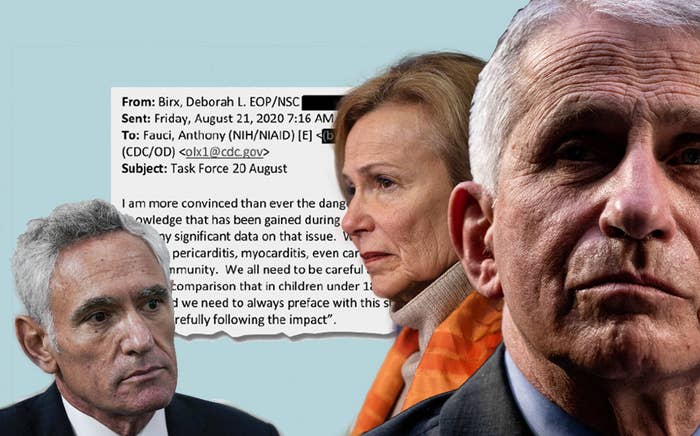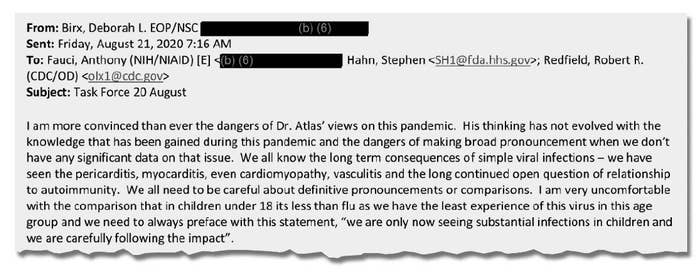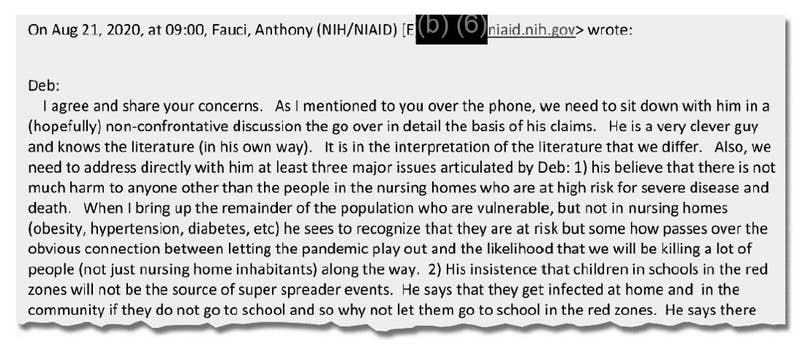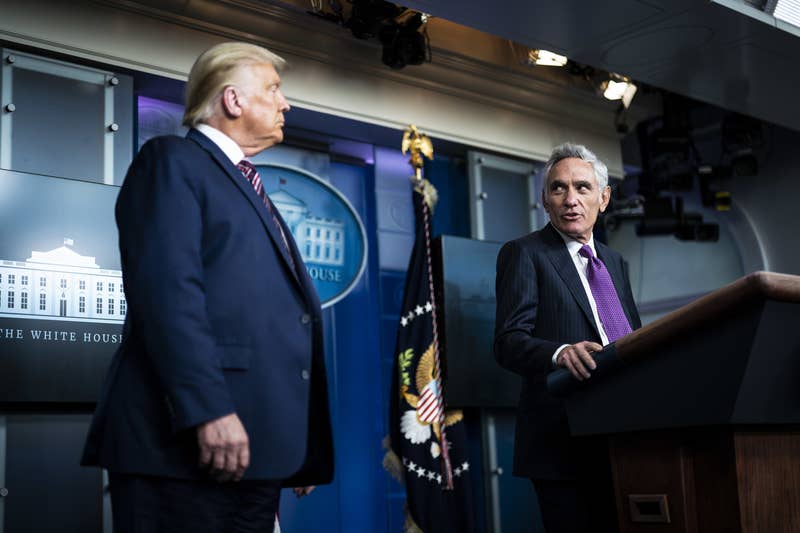“I am more convinced than ever the dangers of Dr. Atlas’ views on the pandemic,” Birx wrote in an August 2020 email to Fauci and others.
Stephanie M. LeeBuzzFeed News Reporter
Dan VerganoBuzzFeed News Reporter
Posted on July 12, 2021, at 5:05 p.m. ET

BuzzFeed News; Getty Images
It only took a few days for Scott Atlas to alarm top US health officials after he became a White House COVID-19 adviser in mid-August of last year.
Anthony Fauci and Deborah Birx had already been sidelined and were struggling to combat falsehood after falsehood spread by former president Donald Trump. Yet the pair quickly realized that Atlas — a senior fellow at Stanford University’s conservative Hoover Institution who routinely downplayed the pandemic on Fox News — was about to make their fight against the virus even harder, according to emails obtained through a public records request and shared with BuzzFeed News.
“I am more convinced than ever the dangers of Dr. Atlas’ views on the pandemic,” Birx, the White House’s coronavirus response coordinator at the time, wrote to Fauci and other top health officials in an Aug. 21, 2020, email — 11 days after Trump had announced that Atlas, a neuroradiologist, would be his newest adviser. She accused Atlas of “providing information not based on data or knowledge of pandemics — nor pandemic responses on the ground but by personal opinion formed by cherry picking data from nonpeer reviewed COVID publications.”

Obtained via FOIA
“This is dangerous and a true threat to a comprehensive and critical response to this pandemic,” she added. “Dr Atlas views appeal to a subsection of American citizens and if allowed to gain traction will reverse months of incredibly hard won gains.”
“I agree and share your concerns,” Fauci, the nation’s top infectious disease scientist, responded on a thread that included former FDA head Stephen Hahn and former CDC chief Robert Redfield. He added, “He is a very clever guy and knows the literature (in his own way). It is in the interpretation of the literature that we differ.”

Obtained via FOIA
The emails — obtained by Charles Seife, a New York University journalism professor — show how alarmed Fauci and Birx were about Atlas, who became one of Trump’s most influential advisers and one of the loudest sources of COVID-19 misinformation in the US.
He infamously advocated for a controversial approach to the deadly virus: letting it spread unchecked among non-elderly people in the absence of a vaccine so that the population at large could develop immunity. Infectious disease experts at the time argued that this strategy would be incredibly dangerous, inevitably leading to large numbers of unnecessary hospitalizations and deaths. But the idea held sway with the president: Weeks after Atlas started on the job, Trump proclaimed on TV that the virus would “go away” once people developed “a herd mentality.”
Fauci and Birx, meanwhile, were almost entirely shut out of the Oval Office, according to their correspondence at the time. “I don’t see the President so I don’t have a counter balance opportunity to this Atlas Dogma,” Birx wrote. “Tony and I did not brief the President nor speak to the President between 22 April and the end of July beyond one vaccine briefing in July.”

Obtained via FOIA
Atlas joined the White House team with no background in infectious diseases or public health. He promoted a steady stream of unscientific views about how the virus spread, who it harmed, and how to control it — views that were widely condemned by the scientific community, including by dozens of his faculty peers at Stanford.
In August, the US death toll was climbing past 170,000, and it was unclear when any of the vaccines under development would prove effective. In her emails at the time, Birx expressed frustration over Atlas’s unscientific stances. “He is convince[d] that we have reach[ed] herd immunity in the NE. Midwest and now the Sunbelt,” she wrote.
Atlas has denied that he was pushing a “herd immunity” strategy to the virus, but he consistently championed the approach in public, even if he didn’t always use the exact term. And he repeatedly questioned the effectiveness of masks, social distancing, stay-at-home policies, and other public health measures to help slow the virus’ spread.
Atlas and Fauci did not return requests for comment for this story. Birx declined to comment.
In their correspondence, Fauci and Birx discussed Atlas’s repeated claims that the only people who needed to be isolated were the nation’s 1.3 million elderly nursing home residents. What his claims left out, they said, were that the 81 million people with underlying conditions also needed protection, and that if the virus was spreading at high levels, it would certainly find its way into nursing homes in those communities, too.
Fauci noted that when he raised the risks faced by vulnerable people with underlying health conditions to Atlas, the Stanford physician was dismissive. He “passes over the obvious connection between letting the pandemic play out and the likelihood that we will be killing a lot of people (not just nursing home inhabitants) along the way,” Fauci wrote.

Jabin Botsford / The Washington Post via Getty Images
Scott Atlas speaks with then-president Donald Trump during a COVID-19 briefing at the White House on Aug 12, 2020.
At the time, with a new academic year approaching, there was a lot of uncertainty around how much the coronavirus could spread among children and in schools. Even before he joined the White House, Atlas was resolute in his calls to reopen schools because, he asserted, children “almost never” transmit the virus, despite studies at the time that strongly indicated that kids can carry, spread, and, in rare cases, die from COVID-19.
Fauci and Birx were more cautious, wanting to first see the results of studies about transmission risk within schools before offering policy recommendations.
“We are only now collecting data that children actually do get readily infected. We need to do the phylogenetic studies to show (or not) just where they get infected,” Fauci wrote. “However, we cannot assume right now that school is not a source of super spread. That is a dangerous and irrevocable assumption.”
Fauci stressed that they needed to discuss this and other issues with Atlas in person: “As I mentioned to you over the phone, we need to sit down with him in a (hopefully) non-confrontative discussion [to] go over in detail the basis of his claims.”
Whether that particular meeting ended up happening is unclear. But Atlas’s views of the pandemic would remain unchanged and reportedly continued to spark fierce disagreement among members of the coronavirus task force. Before he stepped down in November, he and Alex Azar, then the head of the Department of Health and Human Services, met with a group of scientists who authored the Great Barrington Declaration, a hotly contested petition that criticized lockdowns and promoted the idea that the virus should spread to increase the number of people who are immune.
Fauci and Birx have since made it publicly known that they took deep issue with Atlas’s views. In a mid-November appearance on the Today show, Fauci said, “I don’t want to say anything against Dr. Atlas as a person, but I totally disagree with the stand he takes. I just do, period.”
In a January interview after leaving the White House, Birx said that while she was providing data about the coronavirus to Trump, the president was receiving “a parallel set of data” from other sources, likely including Atlas.
And in a new book, Andy Slavitt, a former COVID-19 adviser to President Joe Biden, wrote that Birx told him last year: “Fighting the virus and Scott Atlas together is the hardest thing I’ve had to do.” ●
Posted on July 12, 2021, at 5:05 p.m. ET

BuzzFeed News; Getty Images
It only took a few days for Scott Atlas to alarm top US health officials after he became a White House COVID-19 adviser in mid-August of last year.
Anthony Fauci and Deborah Birx had already been sidelined and were struggling to combat falsehood after falsehood spread by former president Donald Trump. Yet the pair quickly realized that Atlas — a senior fellow at Stanford University’s conservative Hoover Institution who routinely downplayed the pandemic on Fox News — was about to make their fight against the virus even harder, according to emails obtained through a public records request and shared with BuzzFeed News.
“I am more convinced than ever the dangers of Dr. Atlas’ views on the pandemic,” Birx, the White House’s coronavirus response coordinator at the time, wrote to Fauci and other top health officials in an Aug. 21, 2020, email — 11 days after Trump had announced that Atlas, a neuroradiologist, would be his newest adviser. She accused Atlas of “providing information not based on data or knowledge of pandemics — nor pandemic responses on the ground but by personal opinion formed by cherry picking data from nonpeer reviewed COVID publications.”

Obtained via FOIA
“This is dangerous and a true threat to a comprehensive and critical response to this pandemic,” she added. “Dr Atlas views appeal to a subsection of American citizens and if allowed to gain traction will reverse months of incredibly hard won gains.”
“I agree and share your concerns,” Fauci, the nation’s top infectious disease scientist, responded on a thread that included former FDA head Stephen Hahn and former CDC chief Robert Redfield. He added, “He is a very clever guy and knows the literature (in his own way). It is in the interpretation of the literature that we differ.”

Obtained via FOIA
The emails — obtained by Charles Seife, a New York University journalism professor — show how alarmed Fauci and Birx were about Atlas, who became one of Trump’s most influential advisers and one of the loudest sources of COVID-19 misinformation in the US.
He infamously advocated for a controversial approach to the deadly virus: letting it spread unchecked among non-elderly people in the absence of a vaccine so that the population at large could develop immunity. Infectious disease experts at the time argued that this strategy would be incredibly dangerous, inevitably leading to large numbers of unnecessary hospitalizations and deaths. But the idea held sway with the president: Weeks after Atlas started on the job, Trump proclaimed on TV that the virus would “go away” once people developed “a herd mentality.”
Fauci and Birx, meanwhile, were almost entirely shut out of the Oval Office, according to their correspondence at the time. “I don’t see the President so I don’t have a counter balance opportunity to this Atlas Dogma,” Birx wrote. “Tony and I did not brief the President nor speak to the President between 22 April and the end of July beyond one vaccine briefing in July.”

Obtained via FOIA
Atlas joined the White House team with no background in infectious diseases or public health. He promoted a steady stream of unscientific views about how the virus spread, who it harmed, and how to control it — views that were widely condemned by the scientific community, including by dozens of his faculty peers at Stanford.
In August, the US death toll was climbing past 170,000, and it was unclear when any of the vaccines under development would prove effective. In her emails at the time, Birx expressed frustration over Atlas’s unscientific stances. “He is convince[d] that we have reach[ed] herd immunity in the NE. Midwest and now the Sunbelt,” she wrote.
Atlas has denied that he was pushing a “herd immunity” strategy to the virus, but he consistently championed the approach in public, even if he didn’t always use the exact term. And he repeatedly questioned the effectiveness of masks, social distancing, stay-at-home policies, and other public health measures to help slow the virus’ spread.
Atlas and Fauci did not return requests for comment for this story. Birx declined to comment.
In their correspondence, Fauci and Birx discussed Atlas’s repeated claims that the only people who needed to be isolated were the nation’s 1.3 million elderly nursing home residents. What his claims left out, they said, were that the 81 million people with underlying conditions also needed protection, and that if the virus was spreading at high levels, it would certainly find its way into nursing homes in those communities, too.
Fauci noted that when he raised the risks faced by vulnerable people with underlying health conditions to Atlas, the Stanford physician was dismissive. He “passes over the obvious connection between letting the pandemic play out and the likelihood that we will be killing a lot of people (not just nursing home inhabitants) along the way,” Fauci wrote.

Jabin Botsford / The Washington Post via Getty Images
Scott Atlas speaks with then-president Donald Trump during a COVID-19 briefing at the White House on Aug 12, 2020.
At the time, with a new academic year approaching, there was a lot of uncertainty around how much the coronavirus could spread among children and in schools. Even before he joined the White House, Atlas was resolute in his calls to reopen schools because, he asserted, children “almost never” transmit the virus, despite studies at the time that strongly indicated that kids can carry, spread, and, in rare cases, die from COVID-19.
Fauci and Birx were more cautious, wanting to first see the results of studies about transmission risk within schools before offering policy recommendations.
“We are only now collecting data that children actually do get readily infected. We need to do the phylogenetic studies to show (or not) just where they get infected,” Fauci wrote. “However, we cannot assume right now that school is not a source of super spread. That is a dangerous and irrevocable assumption.”
Fauci stressed that they needed to discuss this and other issues with Atlas in person: “As I mentioned to you over the phone, we need to sit down with him in a (hopefully) non-confrontative discussion [to] go over in detail the basis of his claims.”
Whether that particular meeting ended up happening is unclear. But Atlas’s views of the pandemic would remain unchanged and reportedly continued to spark fierce disagreement among members of the coronavirus task force. Before he stepped down in November, he and Alex Azar, then the head of the Department of Health and Human Services, met with a group of scientists who authored the Great Barrington Declaration, a hotly contested petition that criticized lockdowns and promoted the idea that the virus should spread to increase the number of people who are immune.
Fauci and Birx have since made it publicly known that they took deep issue with Atlas’s views. In a mid-November appearance on the Today show, Fauci said, “I don’t want to say anything against Dr. Atlas as a person, but I totally disagree with the stand he takes. I just do, period.”
In a January interview after leaving the White House, Birx said that while she was providing data about the coronavirus to Trump, the president was receiving “a parallel set of data” from other sources, likely including Atlas.
And in a new book, Andy Slavitt, a former COVID-19 adviser to President Joe Biden, wrote that Birx told him last year: “Fighting the virus and Scott Atlas together is the hardest thing I’ve had to do.” ●
No comments:
Post a Comment